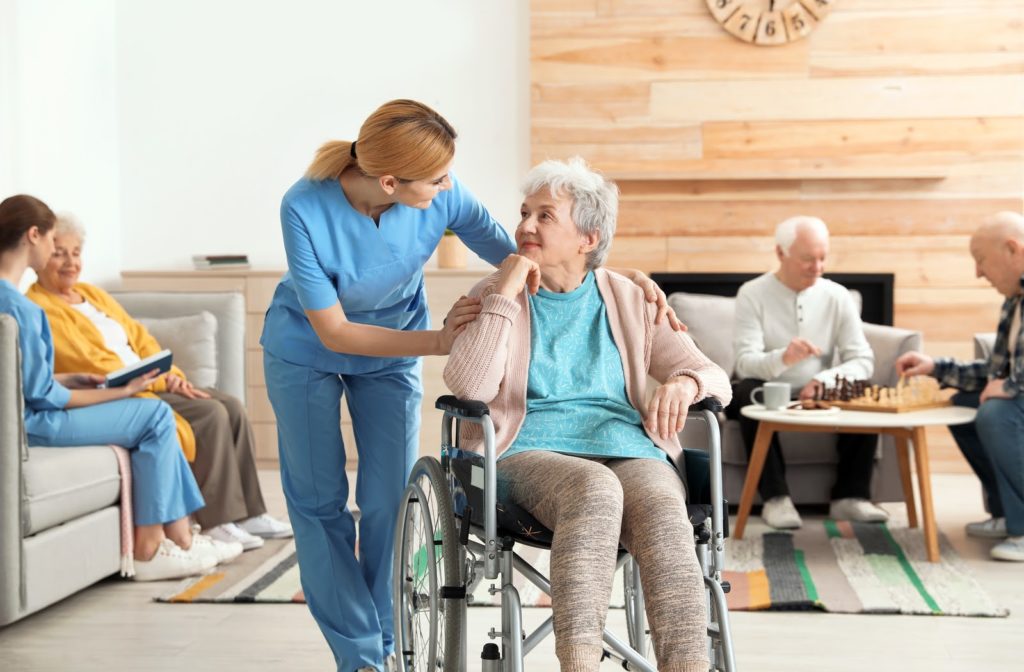Exactly How Helped Living Facilities Enhance Lifestyle for Those With Mental deterioration
Helped living facilities play a pivotal function in improving the quality of life for people with dementia by applying tailored treatment methods that accommodate their distinct requirements. These environments integrate organized activities with emotional assistance, fostering a feeling of area while making certain safety and independence. The assimilation of interesting programs and family involvement better enriches the citizens' experience. The complexities of mental deterioration treatment proceed to evolve, triggering a better exam of how these facilities adapt and introduce to fulfill the obstacles encountered by residents and their households. What ramifications does this have for future treatment models?
Personalized Care Plans
A well-structured customized care plan generally includes specific objectives associated with health and wellness administration, daily activities, and social involvement. It makes up the individual's cognitive decline while advertising freedom and dignity. Regular assessments and updates to the treatment plan are vital, as they allow for alterations based upon the local's evolving problem and preferences.
Key parts of these strategies typically involve drug monitoring, behavior assistance strategies, and dietary standards customized to the individual's needs (Memory Care). By concentrating on individualized treatment, assisted living centers can foster a supportive setting that enhances the lifestyle for people with dementia, inevitably contributing to their overall wellness and happiness. This individualized technique respects the individuality of each local, ensuring they receive the compassionate care they call for

Involving Activities and Programs
Involving residents in significant tasks and programs is important for boosting the lifestyle for people with dementia. These activities not just provide pleasure yet likewise stimulate cognitive function and advertise social communication, which can reduce sensations of seclusion frequently experienced by citizens.

Additionally, customized programs are crucial in making sure that each homeowner's one-of-a-kind choices and capacities are recognized. This customized technique urges engagement, improves self-confidence, and supplies a sense of achievement.
Furthermore, regular analyses of homeowners' rate of interests can aid team customize and adapt activities to far better fit progressing needs. By prioritizing engaging tasks and programs, aided living centers can substantially enhance the overall experience and psychological wellness of people dealing with dementia.
Safe and Encouraging Setting
Producing a safe and encouraging atmosphere is vital for individuals with dementia, as it directly influences their wellness and lifestyle. Assisted living centers are developed with specific attributes that promote safety while promoting a sense of security and convenience. These environments focus on ease of access, with layouts that decrease confusion and urge self-reliance, allowing citizens to navigate their environments more conveniently.
Precaution, such as safe entrances and leaves, avoid straying and unauthorized accessibility, which are crucial considerations for individuals with mental deterioration (Assisted Living). Team members are educated to recognize the one-of-a-kind needs of citizens, providing customized assistance and supervision to guarantee their safety and security. Additionally, the unification of calming shades and acquainted things can help in reducing anxiety and disorientation, creating a much more comforting environment.
In addition to physical security, psychological assistance is paramount. Facilities typically use team who are not only competent in caregiving yet additionally learnt empathy and communication, promoting depend on and relationship with citizens. This all natural approach adds to a nurturing atmosphere where individuals feel valued and comprehended, eventually boosting their total quality of life.
Social Interaction and Community
A supportive environment not only prioritizes safety but also fosters opportunities for social interaction and community engagement, which are crucial for people with dementia. In nursing home, structured activities and communal spaces encourage residents to get in touch with one an additional, reducing sensations of seclusion typically experienced by those with cognitive problems.
Social communication plays a substantial duty in boosting psychological wellness and cognitive function (Assisted Living). Involving with peers in team tasks such as games, arts and crafts, or exercise not just boosts cognitive capabilities however also nurtures a feeling of belonging. Facilities commonly arrange events that promote socializing, allowing residents to construct partnerships and share experiences, which can be especially useful for those with dementia
Moreover, a lively community environment can enhance the general quality of life for citizens. Staff members are educated to help with communications and assistance locals in creating meaningful links.
Family Involvement and Assistance
Family involvement is crucial in supporting people with dementia in assisted living environments. Proactively involving family participants not just provides emotional convenience to residents however additionally fosters a sense of belonging and continuity in their lives. When family members take part in care planning and day-to-day tasks, they contribute important understandings about the individual's choices, background, and requires, which can enhance customized treatment.
In addition, regular family check outs can dramatically improve the psychological well-being of homeowners, reducing feelings of isolation and stress and anxiety. Member of the family can additionally aid in maintaining cognitive function by engaging their loved ones in familiar conversations and activities. This interaction reinforces individuality and assists locals feel valued and comprehended.

(Dementia Care Charlotte)Assisted living centers usually encourage household participation through organized events, support system, and curricula. These initiatives empower households to recognize mental deterioration better and develop efficient communication methods, therefore boosting the top quality of treatment provided. Ultimately, a collaborative method find out here now between households and care team develops a caring setting that advertises self-respect, regard, and overall lifestyle for people with mental deterioration. Such collaborations are crucial for addressing the multifaceted challenges posed by this condition.
Verdict
Finally, helped living facilities considerably enhance the top quality of life for people with dementia through individualized treatment plans, engaging tasks, and a risk-free environment. These components foster cognitive excitement, emotional well-being, and a sense of freedom. In addition, routine social communications and strong family members participation contribute to purposeful links and emotional assistance. Jointly, these factors develop an alternative approach to care that addresses the special needs of people with dementia, advertising overall well-being and self-respect.
Comments on “Discover the advantages of Assisted Living for aging adults.”